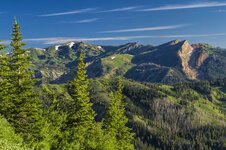Another thing to keep in mind is there are many different types of hunting, so what one guy is using may vary a lot from someone else and although it might not be obvious now, once you are there it will all make sense. We all gravitate to styles of hunting that fit personal preferences.
For instance if you get into an area like this there are about 3 areas that hold elk and they are hunted differently - the vast majority of it isn’t really great for elk. The thicker timber down in the bottoms within 5 miles of your car holds the most elk and is pretty easy to access if your camped at the trailhead - it also has the most pressure from other weekend hunters, although horse hunters will avoid the thickest parts. You need good car camping gear and enjoy putting some miles in on the pack trails that get close to your area - then slowly working through elkish parts and bugling up other young hunters.
There are a few spots right at timberline where a few elk will come to the edges at dusk and feed and lock antlers with a number of bugles throughout the night. I get a rush out of this, but you have to have a cold camp downwind of the elk travel corridors to enjoy it. Not everyone wants to backpack 5 miles uphill for a quiet cold camp experience that’s still in the middle of a bunch of trees. You’ll be trying to connect as they move into and out of hard to see areas.
It‘s a common misconception that a guy can connect by spot and stock hunting with a lot of binocular time from vantage points - the horse hunters cover much more ground and have better access than you ever will, not to mention there are guided hunts camped farther in and they hunt the good spots and have a much better idea of what is where than you will.
The post card of a bull walking across some open timberline meadow in the middle of the day is a fantasy driven by photos from Yellowstone Park - you’ll never spot a local bow hunter up high in the middle of the day and you shouldn’t be either.
Get used to the idea that in addition to equipment, you need other resources to hunt well - develop a knack for getting local knowledge. On one of these high ridges during deer season a couple of well dressed dudes with $8k in rifles, $6k in optics, and the latest camo pattern worked their way up, stopping every 1/4 mile to glass….eventually they made it up to where my cold camp is hidden and we chatted for a bit. They were hunting guides from Montana fitting in a personal trip before Montana‘s season opened. To them it looked like big bucks could be hiding anywhere on this ridge or the next one over in either direction. Man we’re they pumped up having a great time!
They never asked and I didn’t volunteer the information that the ridges they were looking at never have anything but does and young deer, maybe a moose or occasional blackbear. Had they asked I would have explained a lot of the local knowledge and suggested some very good secondary spots where they may actually connect with a good deer, but they were too wrapped up in what they thought things should be.


